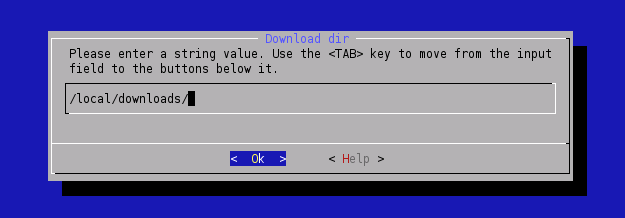LinuxInstall: Difference between revisions
| Line 56: | Line 56: | ||
* '''u-boot.brec''' (BRecord image that can be used with the bootstrap, if U-Boot is not installed or not working, see [[BootLoader]] page) | * '''u-boot.brec''' (BRecord image that can be used with the bootstrap, if U-Boot is not installed or not working, see [[BootLoader]] page) | ||
* '''u-boot.bin''' (U-Boot image file for use with U-Boot itself, see [[BootLoader#Update_U-Boot | updating U-Boot]]) | * '''u-boot.bin''' (U-Boot image file for use with U-Boot itself, see [[BootLoader#Update_U-Boot | updating U-Boot]]) | ||
* '''linux-kernel-2.6.xx-arm.bin''' (Linux image to use with U-Boot, see InstallLinux) | * '''linux-kernel-2.6.xx-arm.bin''' (Linux image to use with U-Boot, see [[Target_Software_Installation#Linux_kernel_installation | InstallLinux]]) | ||
* '''rootfs.arm.jffs2''' (FileSystem/RootFS image to use with U-Boot, see [[Target_Software_Installation#Linux_rootfs_installation | RootFS flashing]]) | * '''rootfs.arm.jffs2''' (FileSystem/RootFS image to use with U-Boot, see [[Target_Software_Installation#Linux_rootfs_installation | RootFS flashing]]) | ||
* '''rootfs.arm.tar''' (for an NFS/MMC RootFS, see RootNFS? & [[MultiMediaCard#Booting_from_MMC.2FSD | Booting from a MMC/SD]]) | * '''rootfs.arm.tar''' (for an NFS/MMC RootFS, see RootNFS? & [[MultiMediaCard#Booting_from_MMC.2FSD | Booting from a MMC/SD]]) | ||
Revision as of 10:03, 13 February 2008
How-To install Armadeus Software Development Kit (SDK) on Linux systems.
The installation was successfully tested on the following distributions:
- Debian Sarge & Etch
- Fedora Core 3 & 4
- SuSE 10.1
- Ubuntu Dapper Drake (6.04)
- Kubuntu & Xubuntu Edgy Eft (6.10)
- KUbuntu Gusty Gibbon (7.10)
Prerequisites for Linux installation
Depending on your distribution, some additional packages are required. For Debian based system, you can use the following command to get them:
$ sudo apt-get install autoconf automake bison flex g++ gettext libncurses5-dev liblzo1 liblzo-dev liblzo2-2 liblzo2-dev \
patch subversion texinfo wget zlib1g-dev libacl1 libacl1-dev
Then, open a shell and follow this procedure:
Get Armadeus software
- If you are a "carefull" user:
then download the latest stable installation tarball from SourceForge: http://sourceforge.net/projects/armadeus and detar it wherever you want.
$ tar xjvf armadeusArchiveName.tar.bz2
- If you are a hacker or a registered developper:
check out the required files from the SVN repository:
$ svn co https://armadeus.svn.sourceforge.net/svnroot/armadeus/trunk armadeus
A directory named armadeus/ will be created on your hard-disk and will contain all the files you need.
Remarks:
- Do not use spaces in the directory name !
- Write access are limited to the integrators (JulienB/Artemys, Salocin, Jorasse)
Configure SDK options
$ cd armadeus/ $ make menuconfig (or just make the first time).
This will launch Buildroot configuration. In Target options ---> Armadeus Device Support menu, select your Armadeus board (apf/apm9328), the RAM size (16/32MB) and so on... Default values should be fine if you have an APF9328.
- You may decrease the compilation time by increasing the number of parallel jobs running simultaneously on your system (the result is not guaranteed). This option is located in Build Options ---> (1) Number of jobs to run simultaneously menu.
- The toolchain is built automatically. During this procedure, several files are downloaded from Internet. The downloaded files are put by default in the armadeus/downloads/ directory. If you have several views we advise you to put all the downloaded files in /local/downloads (for example) by configuring Buildroot to use this directory for all your views: Build options ---> Download dir.
We advise you too to burn a CD-Rom with all the files in downloads/ in case you want to install the development tools on several systems.
- Exit the configuration tool and save your configuration
Launch build
$ make
The toolchain is built automatically. During this procedure, several files are downloaded from Internet. Please wait for a while.... it takes at least one hour for the first run!
The downloaded files are put by default in the armadeus/downloads/ directory. If you have several views we advise you to put all the downloaded files in /local/armadeus/downloads (for example) by configuring Buildroot to use this directory for all your views: Build options ---> Download dir.
We advise you too to burn a CD-Rom with all the files in downloads/ in case you want to install the development tools on several systems.
Enjoy the result
The generated binary files can be found in the subdirectory buildroot/binaries/armadeus/:
- u-boot.brec (BRecord image that can be used with the bootstrap, if U-Boot is not installed or not working, see BootLoader page)
- u-boot.bin (U-Boot image file for use with U-Boot itself, see updating U-Boot)
- linux-kernel-2.6.xx-arm.bin (Linux image to use with U-Boot, see InstallLinux)
- rootfs.arm.jffs2 (FileSystem/RootFS image to use with U-Boot, see RootFS flashing)
- rootfs.arm.tar (for an NFS/MMC RootFS, see RootNFS? & Booting from a MMC/SD)
To keep your copy up-to-date within the armadeus tree
$ svn update
This will update your working directory to the latest release.
Note: if "svn update" fails because a directory or a file already exists, then do:
$ rm -rf <this-directory/file> $ svn update
You can do a:
$ make defconfig
to have the latest features automatically activated and a
$ make menuconfig
to set you again you personnal parameters (SDRAM size...).
You have to do a make to rebuild binary files end then upload the binary files to your target.
Note: if definitively everything goes wrong while it worked before the last update. You can apply the following procedure:
$ rm -rf software/buildroot $ rm Makefile $ svn update $ make $ make
Enjoy!

